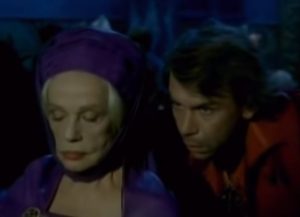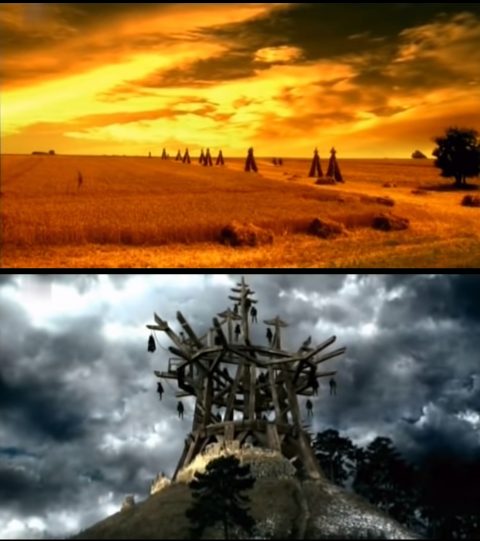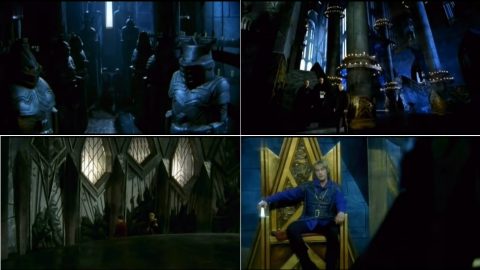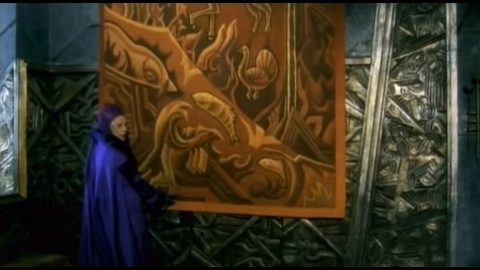I probably love the 2005 French mini-series adaptation of The Accursed Kings better than the book
In what I promise (sort of) is my last swipe at the end of Game of Thrones, the 2005 French mini-series adaptation of Maurice Druon’s The Accursed Kings series is a prime example of the benefit of having a completed book series to adapt. Hindsight allowed series director Josée Dayan and writer Anne-Marie Catois to make well thought out choices about what to keep and what to change. Their choices were validated by the viewership. The mini-series was a huge hit when it was broadcast in France.
But that’s not to say they played it safe. Indeed, some of the directorial choices were exceptionally “out there” for a period piece. While that might turn some people off, I loved it!
The Story
 The television adaption chose to adapt only the first six novels of the series, compressing them into five episodes. It starts before the arrest of the Templars, which has already happened when the novels begin, and ends at pretty much the same moment that Book 6 ends.
The television adaption chose to adapt only the first six novels of the series, compressing them into five episodes. It starts before the arrest of the Templars, which has already happened when the novels begin, and ends at pretty much the same moment that Book 6 ends.
Overall, I think this was a wise decision. While some events feel rushed toward the end, a lot of the meandering subplots that digress from the main conflict are dropped. Even better, the weird epilogue to Book 6 and the terrible final installment are ignored entirely.
As a result, the struggle between Robert and Mahaut rightly takes centre stage, at the cost of losing some of the added detail that makes the world of the novels so rich.
Differences between the two:
- Bye bye King Without a Kingdom (imagine if they’d tried to adapt it; it would be like filming a one-man ASMR podcast.)
- Less time is spent on subplots that distract from the main conflict.
- Physical descriptions of the characters: In Druon’s telling, the physical appearances of the characters are tied indelibly into their personalities. Robert of Artois is a giant of a man, a huge disruptive force, always ready for a fight. Mahaut is fat, gluttonous and also larger than life, literally. In the adaptation, ironically for a visual medium, physical appearances as a manifestation of character were de-emphasized. Instead, the director relied on exceptional casting to bring out personalities.
- Warp speeding through historical events: Events move quickly over the final two episodes. It might be difficult for someone unfamiliar with the events of the book to follow.
What the adaptation does well:
- Giving the Dépardieu family jobs: French acting legend Gerard Dépardieu and his son and daughter all have important roles in this miniseries.
- The cinematography: I’ve mentioned before the influence the source material has had on fantasy fiction, namely A Song of Ice and Fire. The mini-series creates its own fantasy connection through its photography. The scenery itself is very expressive, almost dreamlike at times. It has an ethereal quality, evoking not a distant past, but a vibrant fantasy world out of time.

- The art direction: The art direction of the mini-series really announces that this show won’t be a by-the-numbers period piece. Rather than recreating an authentic 14th century setting, it went all out going ahistorical. The geometric furniture designs, the cavernous, shadowy interiors lit by modern stained glass windows, even the tapestries all seemed more in line with expressionist cinema of the 20’s than a medieval epic. It added to the fantasy elements. I’m not totally sure what Dayan was getting at, but damn it looks good!

- Better characterization for Mahaut: Selfish, petulant and evil in the books, Mahaut is still a truly memorable character. Here, thanks to Jeanne Moreau, she’s given a much more sympathetic protrayal, even as she commits the same evil acts. There’s a touch more vulnerability, and a touch more cleverness. When she gets her comeuppance, there’s more self-awareness than in the books. It makes more a more richly detailed and nuanced villain.

I honestly liked the mini-series even better than the books. I admit, this could be recency bias from the bad taste King Without a Kingdom left in my mouth. But the daring visual style and great acting, combined with a tighter narrative, added to my enjoyment of the story. A story that the adaptation was ultimately faithful to. But because of the historical scope and many events that come to pass, I’d still recommend reading the books before watching the mini-series.